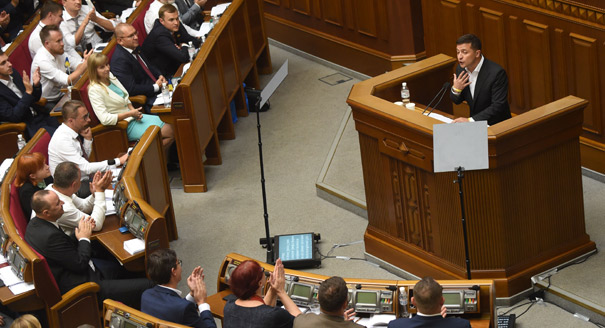{
"authors": [
"Konstantin Skorkin"
],
"type": "commentary",
"centerAffiliationAll": "",
"centers": [
"Carnegie Endowment for International Peace",
"Carnegie Russia Eurasia Center"
],
"collections": [],
"englishNewsletterAll": "",
"nonEnglishNewsletterAll": "",
"primaryCenter": "Carnegie Russia Eurasia Center",
"programAffiliation": "",
"programs": [],
"projects": [],
"regions": [],
"topics": []
}
Source: Getty
Cracks Emerge in Ukraine’s Ruling Party
Faced with a fluctuating approval rating, President Zelensky is attempting to instill order in his party’s ranks. The voting machine that he built from his parliamentary majority is beginning to malfunction as deputies refuse to be mere cogs in that machine.
Volodymyr Zelensky is the first president of Ukraine to have secured a single-party majority in his favor in the Verkhovna Rada, the Ukrainian parliament. In theory, his strong majority should be enough to save the new president from the constant political crises that plagued his predecessors, and ensure the swift and straightforward approval of any reform.
In fact, the monolithic facade of Servant of the People, Zelensky’s party, has already started to show cracks. Just six months after his party’s landslide victory in the parliamentary elections, Zelensky is having to pull out all the stops to ensure his initiatives get enough support from his own party.
Servant of the People is a brand new political force that was formed in the space of just a few weeks ahead of the election. A significant proportion of the new deputies have no political experience, coming instead from a background in small and medium-sized business, or civil activism.
One effect of having a majority is the speed with which the parliament passes resolutions. The new team is in a hurry to implement its election campaign promises, but this haste, coupled with the lack of experience of many lawmakers, increases the risk of taking steps that have not been thought through properly. Servant of the People’s style of work has already been compared to the Russian State Duma, which mindlessly rubber-stamps initiatives from above.
The party’s victory was something of a uniting factor for the country: unlike previous parliaments, in which the parties’ heartlands were divided along geographical lines (the national democrats in the west, and the Party of Regions and Communists in the southeast), the new ruling party represents all the regions. But this also means that there is a large range of opposing views within the parliamentary faction, from pro-Russian campaigners to fierce patriots and those who favor closer integration with the EU.
To prevent the party from splitting into informal lobbies, the parliamentary faction has been divided up at random into groups of fifteen deputies, with each group assigned a deputy head of the faction. But the key factor holding the party’s deputies together is Zelensky himself: they may criticize the government or the administration, but they do not cross the red line behind which stands the president.
Despite these measures being taken to consolidate the faction, since October, the party has with increasing frequency failed to secure a majority in votes, leading to bills being sent back to be amended because of resistance to them from within the faction.
Conformity in the ranks is being damaged by various influence groups within the party, the most powerful of which is linked to the oligarch Ihor Kolomoisky, who has also been linked to the president himself. In his trademark style, Kolomoisky likes to emphasize or exaggerate his influence on the new regime, giving inflammatory interviews to Western media. Recently, his sway over deputies has been in decline: his lack of restraint increasingly brings him into conflict with Zelensky, and the oligarch is becoming a toxic figure.
Another group has reportedly coalesced around the businessman Ilya Pavlyuk, and has apparently already been rebuked by Zelensky for starting to drift toward representing the interests of another billionaire, Rinat Akhmetov.
The emergence of such clans within the faction is inevitable. Many of the deputies elected under the Zelensky brand via single-member districts have already developed a taste for politics and are beginning to think about their own political future. Unanimous voting in favor of unpopular laws doesn’t make them look good in the constituencies that elected them.
This was abundantly clear during the vote on lifting the moratorium on selling private agricultural land: a matter of principle for the president, but one that was not popular with the public. The bill was passed in its first reading, but three members of Servant of the People voted against it, and another sixteen chose to abstain.
Faced with a fluctuating approval rating (a poll by the Kyiv International Institute of Sociology showed that it fell to 52 percent in November, but rose to 62 percent by the end of the year), Zelensky is attempting to instill order in the party ranks. In December, three deputies were excluded from the party’s parliamentary faction for either political disloyalty or concealing an unsavory past (one had been convicted of rape).
Other measures being taken to streamline the ranks include moving over to the proportional representation voting system in elections by eliminating single-member districts, and introducing new restrictions on deputies voting for absent colleagues during parliamentary sessions.
Yet Zelensky is still dissatisfied with the poor discipline in his party, and with the growing number of scandals surrounding it. Bohdan Yaremenko, head of the foreign policy committee, was forced to resign after he was photographed exchanging messages with prostitutes while in parliament. Several other deputies were tricked into telling a prankster of an unhealthy atmosphere within the faction and of deputies getting their salaries in the format of cash in an envelope.
For now, these scandals are relatively harmless compared to the orgy of corruption that characterized previous parliaments. They stem from the phenomenon of ordinary people suddenly finding themselves in power, and from the close attention of hostile media to the president’s party. But for Zelensky, the stakes are too high.
The people don’t know their “servants” very well: Zelensky’s team is uncommonly impersonal, and public faith in it rests entirely on Zelensky’s personal charisma. Since he is creating a system built around his individual popularity, he cannot fail to understand that dissatisfaction with his associates will be reflected in his own rating.
Upon being elected president, Zelensky dissolved parliament in order to reboot the system and eliminate the self-interested oligarchs’ club. But having achieved a dream result in the ensuing parliamentary elections, he used that result to turn the Rada into a machine for voting. Now it is beginning to malfunction, as deputies refuse to be mere cogs in that machine, even for the noble cause of rebuilding the country.
About the Author

Konstantin Skorkin
An independent journalist.
Carnegie does not take institutional positions on public policy issues; the views represented herein are those of the author(s) and do not necessarily reflect the views of Carnegie, its staff, or its trustees.